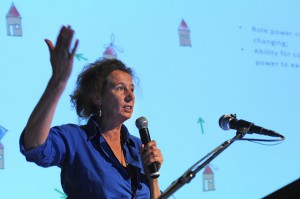 Caroline Nevejan (pictured right), the last speaker of the Unlike Us #2’s first day, closed the Private in the Public session with conceptual yet straightforward presentation on designing participatory systems, as well as trust and presence within such systems. Nevejan focused mostly on the Participatory Systems initiative at TU Delft, where she works as a researcher. This eclectic initiative brings together researchers, artists and practitioners, who acknowledge the need for a new design paradigm in our contemporary networked society.
Caroline Nevejan (pictured right), the last speaker of the Unlike Us #2’s first day, closed the Private in the Public session with conceptual yet straightforward presentation on designing participatory systems, as well as trust and presence within such systems. Nevejan focused mostly on the Participatory Systems initiative at TU Delft, where she works as a researcher. This eclectic initiative brings together researchers, artists and practitioners, who acknowledge the need for a new design paradigm in our contemporary networked society.
(Click here for the video of Caroline Nevejan’s presentation)
This paradigm for socio-technical ecological systems that enable and support participation works by three design principles: (1) design for trust (social acceptance, transparency and security), (2) design for autonomy (empowerment, self-management and self-regulation), and (3) design for human-system interaction (engagement and collaboration).
Starting from the premise that we are not just psychological beings, but also social ones, Nevejan posed several questions that resonated throughout her talk: How can we accept responsibility in this complex environment? How do we become part of larger bodies? How do we trust things? How do we create privacy?
She then explained how the design principles of the Participatory Systems initiative were applied to notions of future energy and food markets. Nevejan claimed that social networks and infrastructures will merge into one big layer and that massive social media platforms such as Facebook are just playgrounds prepping us for what comes next. The energy and food markets of the future might look something like this: people will start making their own panels, delivering part of the energy they harvest to power plants, but trading with each other. In this context, it would be useful if people had personal software agents to represent and negotiate for them. The agents will then start communicating and collaborating with each other, merging into organisations and acquiring autonomy.
To ensure privacy in massive participatory systems that reunite physical layers with software architectures means to focus on carefully delineating agency. A solution for designing this kind of system was already given by economists such as Nobel prize winner Elinor Ostrom, whose work argues that polycentricity – self-organization at lower levels – is the key to a viable global financial system.
Nevejan then emphasized two crucial elements of these systems, presence and trust, and again asked herself how it is possible to design for them. The answer lies in understanding that they are trade-offs, with individuals adjusting to each other’s levels of presence and trust on a continuous basis.
The Participatory Systems initiative has come up with a model called the YUTPA framework, which stands for being with you in unity of time, place and action – this also happens to be one of Aristotle’s old sayings. Nevejan underlined that this four-dimension model was not imposed top-down on social reality, but emerged bottom-up from the collective efforts and shared experience of researchers, artists and practitioners. When it comes to place, she did not refer to just physical locations, but also emotional space both on and offline, and the affordances of such a space. Situated agency: what you can and cannot do, is what matters in a place.
All these four dimensions are measurable and offer the possibility of identifying what role each of them play in different trade-off scenarios and complex social environments of the everyday.
Written by Catalina Iorga


